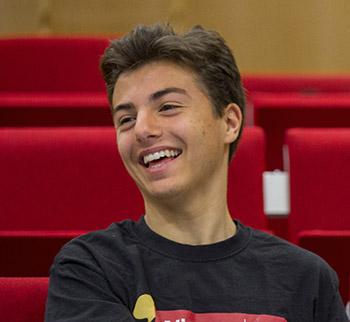
Russell Jacobs and Maya Stopka
Since October, once a month, every month, a group of grade school students have met either virtually or physically at the USC Shoah Foundation Institute for Visual History and Education’s home at USC’s Leavey Library. These students are USC Shoah Foundation’s newest crop of Junior Interns, there to study what attitudes breed hatred and intolerance, how they can spread positive moral authority and be an active participant in civil society using the weight of testimony from the Visual History Archive.
Not to be overlooked are the youngest of the interns – the middle and lower high school students picked for their pluck and genuine interest in taking home from the program a new outlook of the world, that they can share with their communities for the better.
Russell Jacobs, a sophomore in high school, initially had only a familial link to the Holocaust, but since he’s been with the Institute, has found a scholarly interest in the history.
“I wanted to be a Junior Intern because my paternal grandparents are both survivors of the Holocaust,” Jacobs said. “I wanted to learn as much as I possibly could about the Holocaust and other genocides to further enhance my understanding of our world’s history.”
The interns, all seventh grade and above, are expected to use Visual History Archive testimonies to take home lessons about, for example, the different types of memory – personal, collective and cultural – that lend themselves to remembering genocide events; skills for navigating digital media and cultivating media literacy.
“Hearing testimony has been an amazing source to be able to utilize,” Jacobs said. “At meetings, we’ve been listening to testimony and discussing how they make us feel. We prominently focus on how hate happens, and gather into small groups to create presentations about what it is we discuss in order to learn about our peers’ interpretations of certain topics we cover.”
Maya Stopka, an eighth grade student from Natick, Mass. joined the program out of hope to learn how to mitigate hate in society.
“I know how important it is to make sure we never forget the terrible, hateful events like the Holocaust that happened in the past, and I knew this opportunity would help,” Stopka said. “It’s also a great way to connect and collaborate with a diverse group of Junior Interns I would otherwise never have gotten to work with.”
Although Stopka’s commute to USC Shoah Foundation is mostly virtual, she feels connected to her peers and to the Institute through the program’s inclusive discussions.
“At the meetings, we’ve been discussing hateful events that occurred in the past, as well as ongoing issues,” Stopka said. “We learn about the root causes of hate and how to keep things from progressing to violence. So far, I have learned about the different levels of hate and how to prevent them, as well as how stereotypes play a big role in leading up to hate. I’ve learned about the concept of the ‘universe of obligation,’ and have thought intently about the people to whom I have the biggest obligation.”
The interns have been challenged to consider what connects people as human beings, and what causes the disconnects that can lead to violence and genocide – and all attribute their work watching the Visual History Archive and tooling around with IWitness as an answer to that question.
“Testimony has allowed me to really see things through the eyes of victims so I can further understand how bad the situations were for so many people,” Stopka said. “It has shown me victims are real people, not much different from you and me.”
Jacobs was as fascinated by the technology of the Institute as he was the content of the testimonies.
“Throughout the Junior Interns program, I have learned about how society reacts to hate and to what degrees their actions are affected by hate,” Jacobs said. “Testimony has given me an extremely vivid view on how specific genocides affected their victims and made me so appreciative of the amazing resources that USC Shoah Foundation uses. I find it so fascinating that recorded testimony can be viewed so many times and be interpreted in so many different ways, and altogether a vast understanding of how different genocides affected different victims.”
With only a few months left to the program – which goes through June – the Junior Interns will continue to have the opportunity to visit, either virtually or physically, museums and authentic sites, and contribute to the work of the Institute through their own research. Interns like Jacobs and Stopka will continue to craft and deliver presentations on what they’ve learned so far, interact in some capacity with Institute staff and continue to work with people of diverse backgrounds and cultures, putting to use the interpersonal skills they’ve been taught throughout the program.
Upon completion of the internship, all of the Interns will receive a certificate and community service hours, as well the option to continue engaging with the Institute as program assistants or Student Ambassadors.
Jacobs and Stopka aren’t necessarily sure what’s in store for them, but both know they want to pursue careers that put them in the position to really help people when they go to university – Jacobs with aspirations in history, and Stopka looking to study the sciences, particularly biology.
“I believe this program will definitely have a strong, positive impact on my future,” Stopka said. “It will help me to recognize when something needs to be stopped and show me how to make sure people’s stories are never forgotten.”
And to keep up with our Junior Interns’ stories, check out their hashtag, #IWitnessJrIntern.